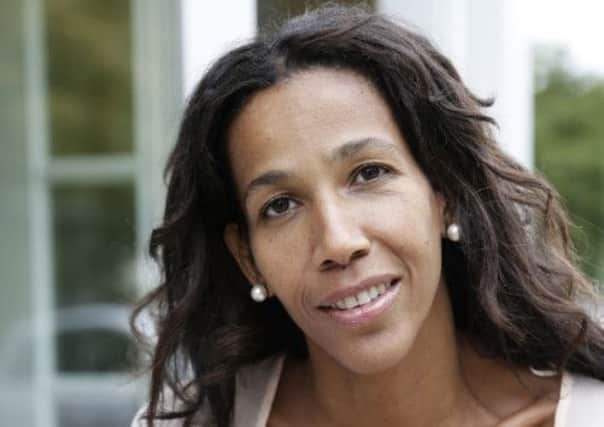Author pens link to Nazi death camp grandfather


Amon: My Grandfather Would Have Shot Me, by Jennifer Teege recounts the extraordinary link between the German-Nigerian author and Amon Goeth, commandant of the Plaszow concentration camp in occupied Poland during the Second World War.
Goeth was a sadist who revelled in the misery and death of his inmates. In the film Fiennes portrays him shooting at prisoners on their way to forced labour just for the fun of it. He also drank wine while watching guard dogs tear people to pieces.
Advertisement
Hide AdAdvertisement
Hide AdMs Teege, 43, is the child of a Nigerian student and the German daughter of Goeth, who was hanged for war crimes in 1946. Known as the ‘Butcher of Plaszow’ he went to his death declaring his loyalty to the Nazi cause.
Ms Teege was given away shortly after birth – her mother Monika had only enjoyed a “fling” with her Nigerian father – and after being fostered she was eventually adopted by a wealthy couple in Munich, seeing her biological mother only occasionally.
Later, she stumbled on a book her mother had written about her father and decided to explore her own family history.
“It was like the carpet was ripped out beneath my feet,” Ms Teege said. “I had to go and lie down on a bench. I called my husband and told him I couldn’t drive and needed to be picked up. Then I said to my family that I did not want to be disturbed, went to bed and read the book cover to cover.
She had seen Schindler’s List – the story about a German businessman based near Plaszow who rescued Jews working for him during the war – while studying in Israel and made no connection then to the monster Goeth.
She went on: “Even though my birth name is Goeth, it wasn’t written out on the screen so when I heard it in the film it didn’t even occur to me that there could be a link.”
Mother-of-two Ms Teege was visited by her grandmother Ruth – Goeth’s former secretary who gave birth to Monika in 1945 – as she was growing up. “Now I know that, as I have black skin, he would have seen me a subhuman like the Jews he killed,” she said.
Since embarking on her journey of discovery she has visited the ruins of Plaszow, outside Krakow, and saw the house which still stands outside it; the house where her father lived as master of life and death.
Advertisement
Hide AdAdvertisement
Hide AdShe is estranged fromher mother, now Monika Hertwig, who gave interviews to an Israeli documentary team in 2010 in a film about the lives of children of Nazi killers. Monika stood outside the house where her father lived and said: “My Nazi father shot women with babies in their arms from this balcony, I am tormented by how much of him is in me.”
“My mother was absolutely unable to cope with her own history. And she wanted to protect me by keeping me in the dark about it,” Ms Teege added. “Once I learned about my family’s past, I had to make a conscious decision to live in the here and now.”
She calls her story “gripping and original,” and says she hopes that people weighed down with guilt about their family pasts will draw inspiration from it.
“My story is about the fact that it’s possible to move beyond repression to gain a kind of personal freedom from the past by finding out who you really are,” she added.
Ms Teege said her middle-class upbringing in wealthy Munich had largely shielded her from racism in today’s Germany.
Now, after wrestling with her mother’s heritage for so long, she is ready to begin exploring her paternal African roots.
“I’m looking forward to learning more about my other side.”